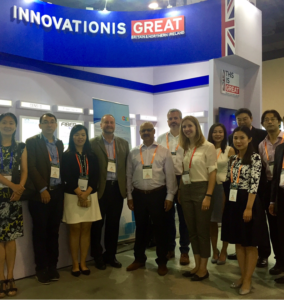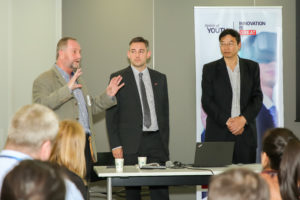28th September 2017 Beijing, China
Sensors for just about everything

Fibre optic cables with acoustic sensing that can be laid alongside railways or oil and gas pipelines to detect faults or security threats; lasers that can detect different types of gases and pollutants with very high precision; sensors that measure water loss across the skin barrier that can be used in cosmetics or  diagnostics; sensors for measuring CO2 levels in buildings – these are some of the technologies represented on our Intelligent Sensing mission to Shanghai and Changzhou this month, and they demonstrate the breadth of exciting applications in this field.
diagnostics; sensors for measuring CO2 levels in buildings – these are some of the technologies represented on our Intelligent Sensing mission to Shanghai and Changzhou this month, and they demonstrate the breadth of exciting applications in this field.
Working with Innovation China UK (ICUK), we brought a delegation of UK companies and academics to participate in the Sensor China Expo in Shanghai and organised workshops for them to meet potential Chinese partners, as well as visits to a local incubator and sensor companies.
 Two of our delegates, Graham Kerr of CENSIS and Liqun Yang of the Knowledge Transfer Network, also gave a ‘Science on Tap’ talk at the British Consulate where the audience was invited to imagine a (not too distant) future in which sensors and the Internet of Things can anticipate our every need – turning on the oven when we are on our way home, making savings by turning down the heating when nobody is in a room, as well as enabling areas like autonomous vehicles and advanced robotics.
Two of our delegates, Graham Kerr of CENSIS and Liqun Yang of the Knowledge Transfer Network, also gave a ‘Science on Tap’ talk at the British Consulate where the audience was invited to imagine a (not too distant) future in which sensors and the Internet of Things can anticipate our every need – turning on the oven when we are on our way home, making savings by turning down the heating when nobody is in a room, as well as enabling areas like autonomous vehicles and advanced robotics.
Sensors are becoming more and more pervasive in our lives as they are an integral part of the Internet of Things, and China, with its mind-boggling rate of urbanisation, is a key market with huge potential for growth. China is predicted to have 221 cities with a population of over 1 million by 2025, and these cities will be in need of smart systems to manage the challenges that accompany rapid urbanisation. Developing and adapting sensor and IoT technologies for the Chinese market is a clear commercial opportunity, and essential for ensuring the energy efficiency of future cities.
The first step in this process is making the right connections. Our UK delegates generated numerous leads for possible future collaborations, and SIN will be supporting them as they move forward.